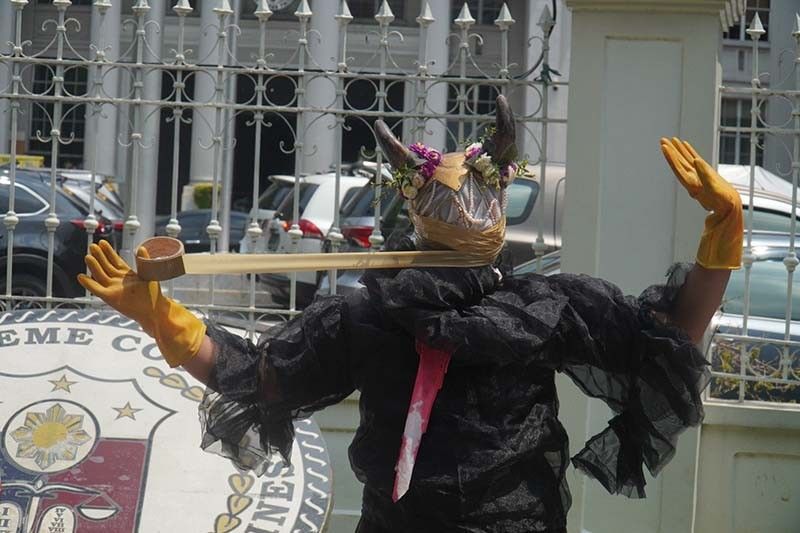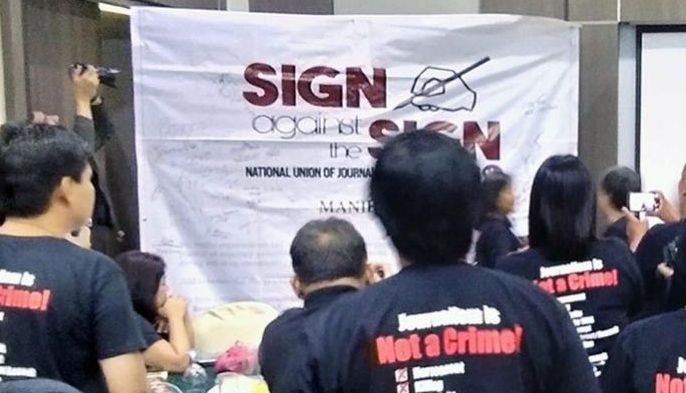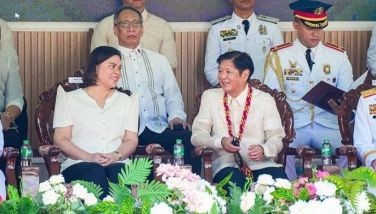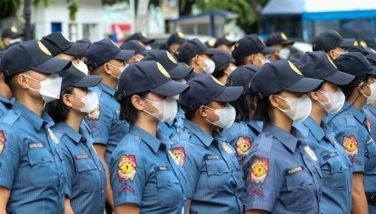In 13th petition filed, journalists and artists warn anti-terror law to further embolden red-tagging

MANILA, Philippines — Citing their own experience of state harassment and red-tagging, a 37-strong group of journalists and writers, led by the National Journalists of the Philippines, assailed the anti-terrorism law before the Supreme Court.
Through their legal counsel, Evalyn Ursua, the group of journalists, writers, artists and other cultural workers across the country urged the SC to strike down the entire Republic Act 11479 or the Anti-Terrorism Act of 2020 (ATA) as void.
The petitioners urged the SC to consider this context in resolving their pleading: That, even before RA 11479 has been instituted, the State have long committed acts that violate the exercise of freedoms and expression.
They asserted that the “new law gives authorities legitimacy in further committing similar violations.”
Journalists, artists red-tagged
In making their case, the group cited the red-tagging, threats and harassment from the State they experience in line of their work.
“Even before the enactment of [ATA], officials of the National Task Force to End the Local Communist Armed Conflict (NTF ELCAC) regularly tag journalists and artists not only as supporters of ‘communists terrorists’ but as active members of the Communist Party of the Philippines or the New People’s Army,” their 31-page petition, the 13th filed against the ATA, read.
Red-tagging is defined by Philippine jurisprudence as “the act of labelling, branding, naming and accusing individuals and/or organizations of being left-leaning, subversives, communists or terrorists (used as) a strategy... by State agents, particularly law enforcement agencies and the military, against those perceived to be ‘threats’ or ‘enemies of the State.’”
The petitioners cited several statements of NTF ELCAC accusing journalists—even ABS-CBN owners, executives and employees—as part of propaganda machinery of the CPP.
The NTF ELCAC also tagged the Concerned Artists of the Philippines as “’open sectoral organizations’ of the leftist underground movement of artists,” they said.
“The Anti-Terrorism Act of 2020 will further enable those violations and deprive petitioners and all Filipinos who engage in legitimate expression and dissent of the protection guaranteed under the Philippine Constitution,” they added.
Law violates freedom of speech, expression
As journalists and artists, the petitioners said they are “involved in some form of legitimate exercise of free speech and expression.” Due to the vagueness of terrorism definition under the law, an editorial cartoon may be seen as “advocacy or protest or dissent” and authorities may claim it intends to cause serious physical harm to a public official, or intimate the government.
“Section 4 thus threatens petitioners’ rights not just sporadically but continuously given the nature of their work,” they said.
They also moved that Sections 4 and 9 of the law, that define terrorism and inciting to terrorism, respectively, involve content-based restraint on speech and expression.
In the landmark Chavez vs Gonzalez case, the held government action that “restricts freedom of speech or of the press based on content is given the strictest scrutiny in light of its inherent and invasive impact.”
A content-based restraint is defined as a restriction based on “subject matter of utterance or speech.” Prior restraint, meanwhile, is government restrictions “on the press or other forms of expression in advance of actual publication or dissemination.”
Taking this into consideration, the two assailed provisions of the law cannot pass the clear and present danger test.
“While both Sections supposedly seek to stop the evil of terrorism, their scope is so sweeping that their prior restraint on free speech and expression cannot be justified,” they said.
This is the 13th petition filed challenging the constitutionality of the anti-terrorism law at the SC.
President Rodrigo Duterte signed the Anti-Terrorism Law on July 3 despite opposition from rights groups and civil society groups that it could be used to stifle human rights.
A petition against the law has been filed at the Supreme Court and other groups are preparing pleadings of their own.
Follow this page for updates. Photo courtesy of The STAR/Michael Varcas
National Security Adviser Hermogenes Esperon moves to block access to several websites, including news sites of alternative news orrganizations Bulatlat.com and Pinoyweekly.org.
In his letter to the National Telecommunications Commission, he only says the websites are "affiliated to and are supporting these terrorists and terrorist organizations."
No other basis to back up his allegation was cited in the letter.
Citing the designation of the CPP-NPA-NDF as terrorists, NSA Hermogenes Esperon moves to block access to several sites.
— Kristine Patag (@kristinepatag) June 22, 2022
In Esperon's letter to the NTC, he included news sites @bulatlat and @pinoyweekly; sites of other progressive groups RMP and Save our Schools. @PhilstarNews pic.twitter.com/nAzMITJFsS
The Commission on Human Rights says it "partly welcomes" the Supreme Court decision that some parts of the controversial Anti-terrorism Law are unconstitutional.
CHR spokesperson Jacqueline de Guia says the commission remains hopeful that the remaining contentious provisions of the law will be clarified by the high cour in the full text of the decision.
"At the same time, our commitment remains in guarding against possible human rights violations arising from the implementation of the anti-terror law. We steadfastly remind the government that countering terrorism and protecting human rights are not competing values but are, in fact, mutual and complementary," De Guia says in a statement.
The Supreme Court has deliberated and voted on the controversial Anti-Terrorism Act but the decision will be released "at the soonest time possible."
"However, considering that there were numerous issues resolved in the case, as well as the fact that each Justice had to vote on each issue, there is a need to accurately confirm and tally the vote of each Justice in order to ensure the correct resolution of the Court per issue," SC spokesperson Brian Hosaka says.
The Anti-Terrorism Council designates the National Democratic Front of the Philippines, the panel that negotiates for communist rebels during peace talks a terrorist organization.
Previous designation of the Communist Party of the Philippines and New People's Army led to the designation of supposed members of the CPP's Central Committee. Among those designated as terorrists were peace consultants.
Designation gives the Anti-Terrorism Council the authority to investigate and freeze the accounts of designated persons.
The Anti-Terrorism Council has designated 29 people, including alleged members of the Communist Party of the Philippines-New People's Army, as terrorists in two resolutions.
Designation allows the Anti-Money Laundering Council to freeze the assets of those on the list.
- Latest
- Trending


































